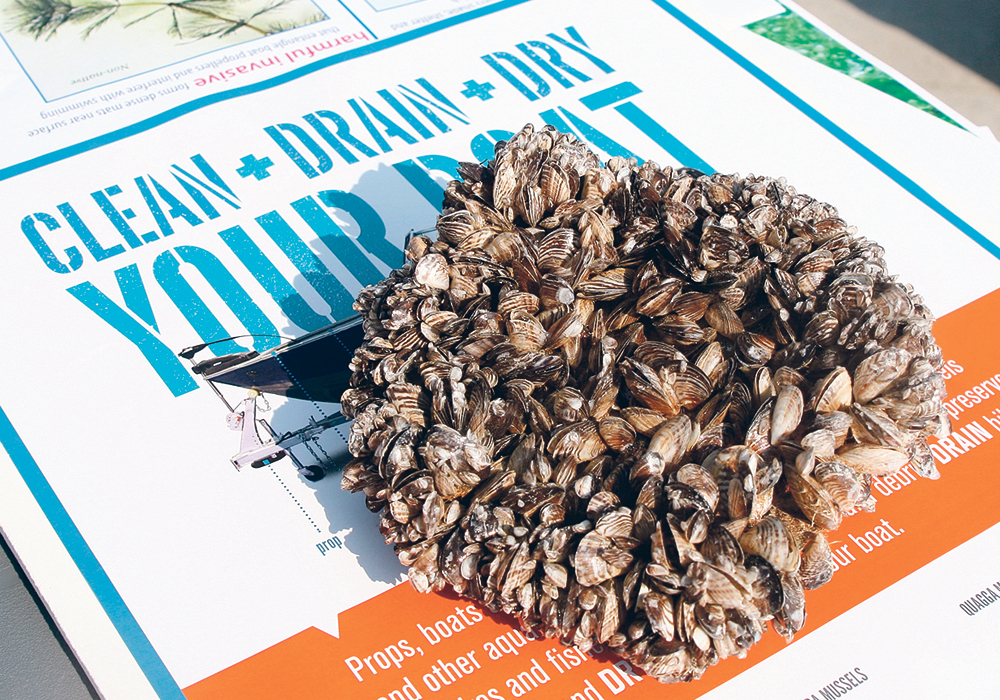The province plans to spend $700,000 this year on inspection stations, online information and public awareness
Saskatchewan hasn’t yet had a confirmed case of zebra mussels but that hasn’t stopped the provincial government from increasing the time and resources dedicated to keeping the province free of the invasive species.
This year Saskatchewan plans to spend $700,000 on its prevention programs that include inspection stations, online information and public awareness programs. The funding for the prevention of aquatic invasive species like zebra and quagga mussels has been increased over the last few years as new information is gathered.
“I think we are trying to take a strategic and risk-based approach to aquatic invasive species prevention and as we continue to gather more data about watercraft movement in the province, we’re identifying gaps within our program related to inspection,” says Matt Tyree, fisheries unit manager with the fish and wildlife branch of the Ministry of Environment. “So we are really just working to increase capacity of our program and just to ensure that we are closing down those gaps and that we are really being as effective as we possibly can with respect to prevention.”
Read Also

Farming Smarter receives financial boost from Alberta government for potato research
Farming Smarter near Lethbridge got a boost to its research equipment, thanks to the Alberta government’s increase in funding for research associations.
A big part of the prevention strategy involves inspection and decontamination stations. Most of these stations are set up between Saskatchewan and places that have known zebra mussel populations like Manitoba and Montana.
“We have permanent inspection stations set up at really strategic locations along the federal border as well as the Saskatchewan-Manitoba border,” says Tyree.
“Most watercraft coming in do not require decontamination but in the event we have a boat that is deemed high risk, we utilize those decontamination units before we release that watercraft to be launched anywhere in Saskatchewan or Western Canada.”
Invasive mussels not only pose a huge threat to Saskatchewan’s native species and ecosystems but also are a concern for water-related infrastructure like hydro facilities and agriculture irrigation.
“(Zebra mussels) have the ability to colonize on the inside of pipes and that rapidly reduces the ability for water to move through those systems and in some cases can even clog them up,” says Tyree.
“It ends up causing some significant challenges to those types of infrastructure and ends up leading to significant costs trying to manage and keep those systems clean and operational.”
Saskatchewan has not yet done an economic assessment of the potential costs the introduction of invasive mussels would have on the province but at the Pacific NorthWest Economic Region (PNWER) summit, hosted in Saskatoon in July, Alberta MLA Richard Gottfried said, Alberta officials have estimated more than $75 million in potential costs if these mussels were introduced to their province. Saskatchewan could be looking at similar costs, which is why Tyree believes keeping them out all together is the best option.
“Prevention is certainly the priority; it’s obviously cheapest to just stop them from coming in entirely. Management is quite expensive,” he says. “For instance (Manitoba) had to make a dramatic shift, strategically, in how they are managing watercraft inspection. Having an infected lake pushes a lot of their resources to containment, whereas the rest of Western Canada is really focused on closing those gaps of watercraft coming in from infected jurisdictions.”
Tyree says the province is doing a good job but more can be done, particularly in terms of collaboration with other provinces and territories.
“We are part of a western invasive agreement which is the western Canadian provinces and territories and really looking for ways to leverage those relationships to be more efficient with our program. We co-ordinate watercraft inspection now across Western Canada, which allows us to be more effective with less resources,” says Tyree.
“But, I think given the fact that we are neighboured to provinces and states that have zebra mussels and the fact that we’ve been able to keep them out of the province to date, I would say that we’ve been extremely effective.”

















